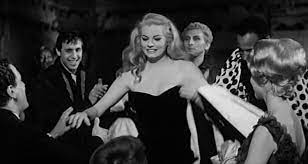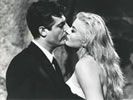Eye For Film >> Movies >> La Dolce Vita (1960) Film Review
La Dolce Vita
Reviewed by: Angus Wolfe Murray

The image of Anita Ekberg in a Roman fountain is as iconic as Marilyn Monroe astride the subway street vent in the sweltering heat of a New York summer. Neither says a great deal about the movies in which they appeared. La Dolce Vita is an episodic, two-and-a-half hour trawl through the morally dysfunctional life of a gossip columnist, while The Seven Year Itch concerns a married man left on his own in the city when his family is away on vacation.
The opening of Federico Fellini's modern masterpiece is as symbolic and unforgettable as the dead "sea monster" on the beach at dawn, which closes it. A helicopter flies low over Rome, carrying a statue of Christ that hangs from ropes, like a forgiving angel with its arms outstretched, followed by another, carrying Marcello Rubini (Marcello Mastroianni) and a member of the paparazzi.

The Swinging Sixties, or whatever they called it in Italy, opens with a hangover, as The Fifties takes its leave on a blast of rock'n'roll. Marcello is right in there, tripping over trivia ("What wine did the prince order?") and servicing the ladies of leisure ("You're so rich that when you fall you land standing up") with carnal indiscretions and a cynical line in sympathetic observation.
He is not so well connected as known in the drawing rooms, showbiz venues and night clubs of Rome and has an easy charm that slides effortlessly past the defences of the rich and famous. Also, he appears to fall in love, or, at least, confess as much, at the hint of an exclusive. Professional ethics are as screwed up as his girlfriend (Yvonne Furneaux), whose emotional needs put intolerable pressure on his freewheeling style of working the jet set and staying one scoop ahead of the paparazzi, who are encumbered by heavy cameras with flashbulbs that need changing every time.
Fellini captures the schizophrenic nature of a journalist's life extremely well, assisted in no small part by Mastroianni's inspirational performance. Often hailed as a sophisticated satire, La Dolce Vita's insights into high society's night time indulgencies look barely exaggerated. The hedonistic merry-go-round that encourages betrayal and despair, ending in the sullied light of the morning after, seems as realistic as the futility of throwing parties at the financially over endowed, in the hope of creating magic, or the illusion of pleasure.
Ekberg plays a Swedish actress, with pre-implant Jordanesque knockers and a brain the size of crystallised testicles, who is dubbed by Audrey Hepburn's vocal double and behaves like a little girl who has escaped from a school trip and finds everything terribly exciting, except for her sarcastic, alcoholic American husband (Lex Barker). Marcello calls her "the first woman of creation," which, as a pick up line, is more inventive than "etchings at my place," but it fails to puncture the soft walls of self-absorption that protect her.
The film is too long and too scattered, although in 1960 it broke artistic and cultural barriers. Once, Marcello had ambitions to be an intellectual and a writer. By the end, having moved into the sycophantic nest bed of public relations, he has sold what remains of his soul. The final shot on that chilling white beach is a triumph of expediency over innocence.
With passion and skill, Fellini attacks the world of celebrity and social decay, exposing its falsehood and weakness by using an amoral, muckraking reporter's fall from grace as insincerity's victory over truth. In 2006, only the drugs have changed.
Reviewed on: 27 Nov 2006


















